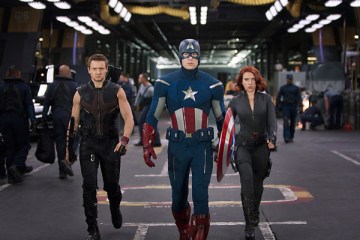Like my learned colleague, I find myself happy about the recent full season pick-up for Marvel’s Agents of S.H.I.E.L.D., as I’m still holding out hope that the Joss Whedon-created series might still turn into the show is should be. Unlike Mr. Poniewozik, however, I’m not sure that Agents will ever manage to fulfill that potential. In fact, the more I think about it, the more I suspect that it’s ultimately doomed to failure.
My feelings go beyond how dull the series has been since its pilot episode — the second episode, in particular, was especially lackluster with an entirely undefined McGuffin, completely generic bad guys and direction that just emphasized the lack of budget when it came to the action set pieces. And extend further than the 38 percent drop in viewership that the series suffered after that first episode (as if more than a third of the — admittedly sizable — audience that tuned in on week one collectively shrugged their shoulders and decided “Nah, not for me”).
Instead, the problem with the series is what Agents of S.H.I.E.L.D. has to do — and how difficult it will be to actually achieve that task, considering the restrictions it’s working under.
The unofficial, yet clearly implied unique selling point of Marvel’s Agents of S.H.I.E.L.D. has, since the show was announced, been that it would be just like Marvel’s The Avengers. Only on a weekly basis. And for television. There’s a lot to unpack in that promise. What was it about that movie — written and directed by Whedon — that made it so wildly successful? And is it really something that could be replicated for serial television?
After all, It’s not as if ABC could afford to have Robert Downey Jr. and Mark Ruffalo trade barbs for forty-two minutes every week. Stripped of the ability to bring the movie’s scale of action, adventure and destruction, Agents of S.H.I.E.L.D. had only a few pieces of Avengers‘ core appeal to play with.
In the insular world of comic books, “stories that matter” translates into “stories that appear to alter the status quo of an entire fictional universe or, at the very least, an important character’s place therein.” That’s explains the last ten years of the Marvel Universe in comic books, with their three unrelated intra-superhero-community “wars,” the deaths of Spider-Man, the Human Torch and Captain America, two separate alien invasions, the near-genocide of the human race (It all got fixed by time travel) and other oversize story lines.
If that’s what fans of the genre respond to, could Agents of S.H.I.E.L.D. deliver on that kind of level? Apparently not; a recent interview with the show’s executive editor Jeffrey Bell revealed that the series will be playing it safe when it comes to the greater Marvel Cinematic Universe. “For us to have powers every week kind of explodes their movie universe in a way we didn’t want to do,” Bell explained. “We have to be judicious, otherwise we’ve got 20-some new superheroes running around at the end of the first season, and suddenly [the next Avengers film, Avengers: Age of Ultron] is a very different movie.”
Agents of S.H.I.E.L.D., then, becomes a show that exists within the Avengers world, tries to appeal to the Avengers audience, but is unable to tell stories with the same scope or same kind of stakes for fear of upsetting the more lucrative movies. Unless everyone involved works out a way to suddenly and reliably offer up Whedon-esque zingers with more ease than they’ve managed so far, it’s only a matter of time before S.H.I.E.L.D. finds itself facing the ultimate threat: Cancellation.


